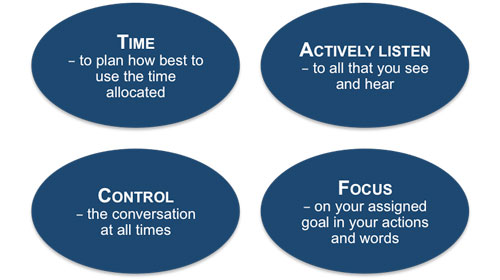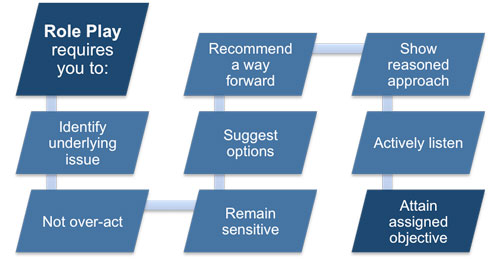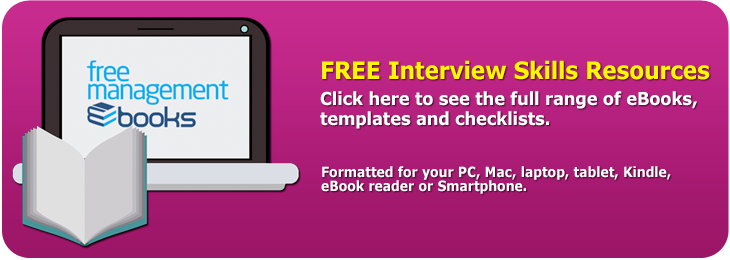Role Play Exercise
This exercise is popular because it gives a real insight into how an individual will interact with others in situations they have little direct control over. It is an excellent way for a potential employer to see if you possess the attitudes and behaviors they want in their organization.
Most people find it difficult to act naturally in contrived situations like those used for role play exercises. It's important to remember that the role play scenario may seem artificial but it will imitate the types of issues and problems you will encounter in the role. The more you can overcome the discomfort of being in an unnatural situation the better you will be able to demonstrate the behaviors required by the role.
 |
Typically you will be given an overview of your role and the background circumstances that have resulted in the scenario you have been asked to act out. Forms and procedures used will be as realistic as possible without compromising confidentiality.
You will be given an objective to achieve in the time allocated. For example:
• Negotiate a significant alteration to a project deliverable
• Resolve a customer complaint
• Discipline one of your team
• Address under-performance with a team member
The best use of your preparation time is to use the information contained in the brief, along with your knowledge of the role and the organization's culture to define the most effective strategy your should adopt ensuring you attain the desired goal. You need to quickly identify the key issues presented in the exercise brief and decide the best tactics at your disposal to attain the objective set. This structured approach enables you to ascertain potential obstacles that may arise and how best to deal with them.
The more prepared you are for this type of exercise the better you'll be able to demonstrate the behaviors required for the role and show you closely match the role and the organization. This means researching the organization's culture, leadership styles, and role competencies so that you know what is required.
Having identified the required competencies you need to break them down into the expected behaviors. By mapping your own behaviors against these you can assess how well they match. If this gap is excessive you need to use the competency development cycle to raise your behaviors to those of the role.
 |
The most common trap individuals fall into during this exercise is to become sidetracked from the objective, which results in running out of time. To avoid being ensnared in such situations you should incorporate the T.A.C.F. philosophy into your strategy and notes you will use during the exercise.
TIME - plan how best to use the time allocated to achieve the assigned objective. Take a minute or two to verify your understanding of the situation with the other party (or parties) involved in the role play. Clearly state what you want to achieve at the end of this discussion. Do not forget to allocate enough time so that the final few minutes are dedicated to drawing the discussion to a close. Ideally, all parties will agree on the substance of what has been said and on any forward actions.
ACTIVELY LISTEN - to everything the other party says and avoid getting sidetracked or distracted by the other party's emotions. (Learn how to develop your active listening skills.) This exercise is designed to test this particular behavior as the situations you are presented with often arise from poor communications in some previous interaction.
CONTROL - ensure that you maintain control of the conversation at all times and keep it focused on attaining the exercise objective. You need to demonstrate your ability to control and defuse any conflict that may arise. Remember the other party's reasoning may not be realistic or typical because their objective is to test how you react and behave in stressful and aggressive situations.
FOCUS - keep the aim of the exercise at the forefront of your words and actions. Do not end the exercise without having achieved something even if it is only to arrange another opportunity to continue the discussion. If you feel the assigned objective is confusing then rephrase it at the outset so that expectations are clear. This may be your first test to see if you behave appropriately for the role, i.e. do you behave as a manager or supervisor?
 |
The behaviors this exercise assesses are your verbal communication and interpersonal skills, but role play can also evaluate other less obvious competencies.
The type of examples you could be presented with to demonstrate such behaviors are:
Change Agent - you are responsible for a key strategic project which will significantly change how your organization and its employees operate. One member of your project team (Jim) is consistently missing deadlines and this is beginning to undermine the project. The task you have been given in the role play is get Jim on board with the project plan. You need to understand why Jim is having problems and explain how his missed deadlines are impacting others and the project as a whole. By the end you must gain his agreement on how best to move forward and how issues the discussion has raised will be handled. For this type of scenario it will also be expected that you tackle the issues that Jim may have with the strategic change that will occur on the completion of the project.
Coach or Mentor - you have inherited an inexperienced team that you need to develop so that you can properly delegate tasks. Your role play is to brief Sarah, one of your supervisors, so that she is able to take on the responsibility of briefing and training her team to perform the assigned task. This scenario allows you the opportunity to demonstrate your abilities as a coach or mentor. The style of leadership and skills in communication you adopt in this exercise will show how well it matches the expectations of the organization. It also offers you the chance to demonstrate your delegation skills and how you would develop team members.
Customer Centric - every organization has the 'awkward customer'! Your team has a longstanding 'problem' customer that they are actively avoiding. Unfortunately you have received a complaint from the customer about the way Powell handled their last call.
Your role play task is to decide on an initial tactic to deal with this complaint and gain Powell's support in devising a team strategy for dealing with these types of customer. You need to demonstrate a clear understanding of the customer's business (as far as the brief allows) and demonstrate how you would set the customer's expectations of the future interactions with your team.
In all these scenarios prospective employers are able to gain an excellent sense of your level of emotional intelligence (EQ). Are you able to demonstrate the right level of personal and social awareness so that you can be seen as someone who would be competent in the role?
You need to show that you remain calm and objective during aggressive or stressful situations. You gain a rapport with the other party demonstrating your ability to understand the emotions of another person. The concept of EQ was popularized by Daniel Goleman in his book Emotional Intelligence - Why It Can Matter More Than IQ (Bloomsbury Publishing, 1996). In it he states that there are three criteria we are judged by in the workplace:
"… We are being judged by a new yardstick: not just by how smart we are, or by our training and expertise, but also by
how well we handle ourselves and each other." (Goleman 1996)
As part of your preparation for interview exercises, and especially role play, it is essential that you know your level of EQ and how it relates to the competencies of the role. To ensure your success in attaining the role it may require some development of your emotional intelligence.
You may also be interested in:
Preparing for Interview Exercises | In-Tray or In-Basket Exercise | Role Play Exercise | Group Exercise | Presentation Exercise | Handling the Media Exercise.


